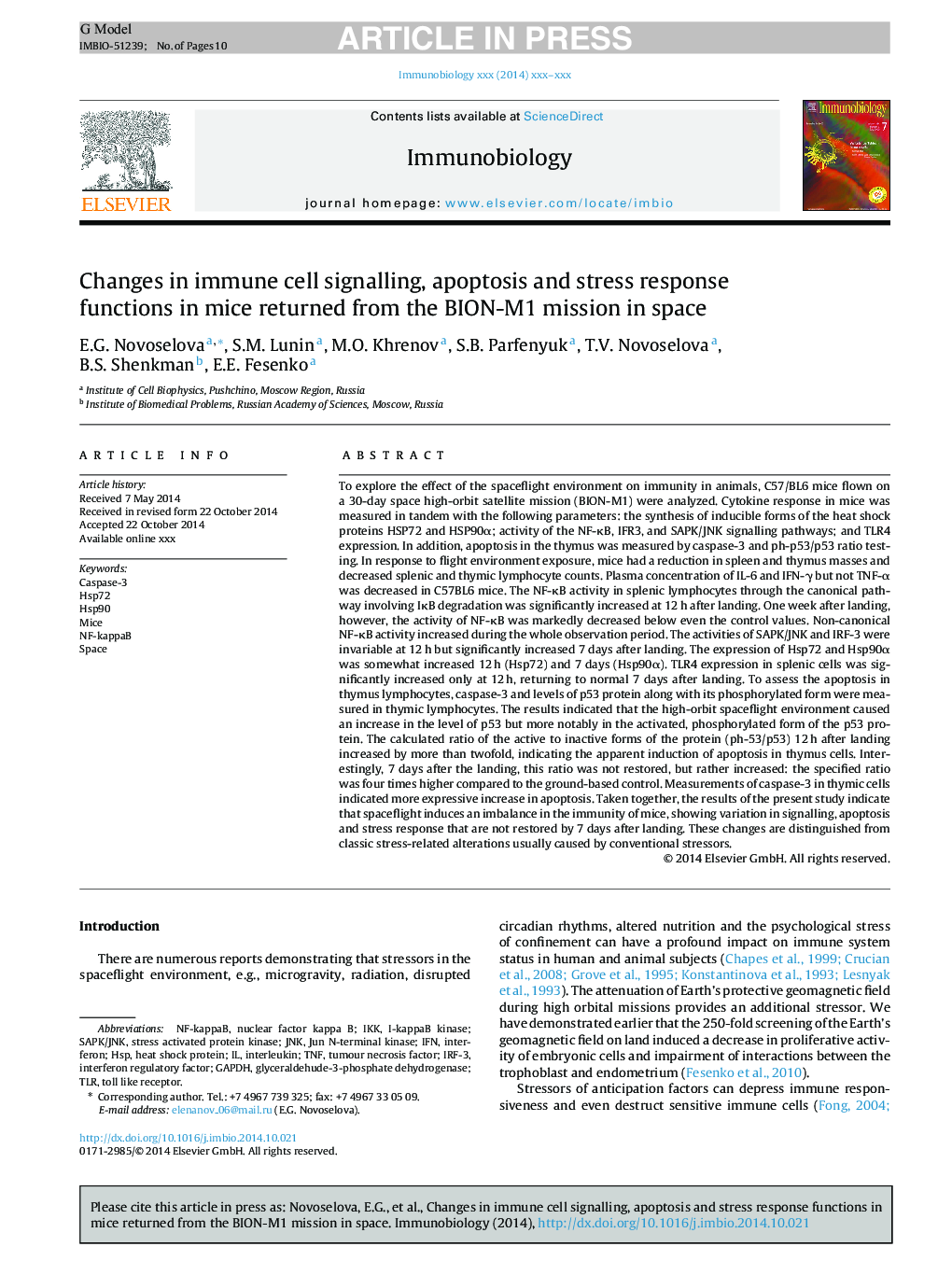| کد مقاله | کد نشریه | سال انتشار | مقاله انگلیسی | نسخه تمام متن |
|---|---|---|---|---|
| 10940862 | 1095526 | 2015 | 10 صفحه PDF | دانلود رایگان |
عنوان انگلیسی مقاله ISI
Changes in immune cell signalling, apoptosis and stress response functions in mice returned from the BION-M1 mission in space
دانلود مقاله + سفارش ترجمه
دانلود مقاله ISI انگلیسی
رایگان برای ایرانیان
کلمات کلیدی
JnkI-kappaB kinaseTNFHSP72IRF-3Jun N-terminal kinaseNF-kappaBIKKTLRHspHSP90GAPDHSAPK/JNK - SAPK / JNKstress activated protein kinase - استرس فعال پروتئین کینازinterferon - اینترفرونIFN - اینترفرون هاinterleukin - اینترلوکینtoll like receptor - تلفات مانند گیرندهinterferon regulatory factor - عامل تنظیمی اینترفرونtumour necrosis factor - عامل نکروز تومورnuclear factor kappa B - فاکتور هسته ای کاپا BSpace - فضاMice - موشHeat shock protein - پروتئین شوک حرارتCaspase-3 - کاسپاز ۳
موضوعات مرتبط
علوم زیستی و بیوفناوری
بیوشیمی، ژنتیک و زیست شناسی مولکولی
بیولوژی سلول
پیش نمایش صفحه اول مقاله

چکیده انگلیسی
To explore the effect of the spaceflight environment on immunity in animals, C57/BL6 mice flown on a 30-day space high-orbit satellite mission (BION-M1) were analyzed. Cytokine response in mice was measured in tandem with the following parameters: the synthesis of inducible forms of the heat shock proteins HSP72 and HSP90α; activity of the NF-κB, IFR3, and SAPK/JNK signalling pathways; and TLR4 expression. In addition, apoptosis in the thymus was measured by caspase-3 and ph-p53/p53 ratio testing. In response to flight environment exposure, mice had a reduction in spleen and thymus masses and decreased splenic and thymic lymphocyte counts. Plasma concentration of IL-6 and IFN-γ but not TNF-α was decreased in C57BL6 mice. The NF-κB activity in splenic lymphocytes through the canonical pathway involving IκB degradation was significantly increased at 12 h after landing. One week after landing, however, the activity of NF-κB was markedly decreased below even the control values. Non-canonical NF-κB activity increased during the whole observation period. The activities of SAPK/JNK and IRF-3 were invariable at 12 h but significantly increased 7 days after landing. The expression of Hsp72 and Hsp90α was somewhat increased 12 h (Hsp72) and 7 days (Hsp90α). TLR4 expression in splenic cells was significantly increased only at 12 h, returning to normal 7 days after landing. To assess the apoptosis in thymus lymphocytes, caspase-3 and levels of p53 protein along with its phosphorylated form were measured in thymic lymphocytes. The results indicated that the high-orbit spaceflight environment caused an increase in the level of p53 but more notably in the activated, phosphorylated form of the p53 protein. The calculated ratio of the active to inactive forms of the protein (ph-53/p53) 12 h after landing increased by more than twofold, indicating the apparent induction of apoptosis in thymus cells. Interestingly, 7 days after the landing, this ratio was not restored, but rather increased: the specified ratio was four times higher compared to the ground-based control. Measurements of caspase-3 in thymic cells indicated more expressive increase in apoptosis. Taken together, the results of the present study indicate that spaceflight induces an imbalance in the immunity of mice, showing variation in signalling, apoptosis and stress response that are not restored by 7 days after landing. These changes are distinguished from classic stress-related alterations usually caused by conventional stressors.
ناشر
Database: Elsevier - ScienceDirect (ساینس دایرکت)
Journal: Immunobiology - Volume 220, Issue 4, April 2015, Pages 500-509
Journal: Immunobiology - Volume 220, Issue 4, April 2015, Pages 500-509
نویسندگان
E.G. Novoselova, S.M. Lunin, M.O. Khrenov, S.B. Parfenyuk, T.V. Novoselova, B.S. Shenkman, E.E. Fesenko,